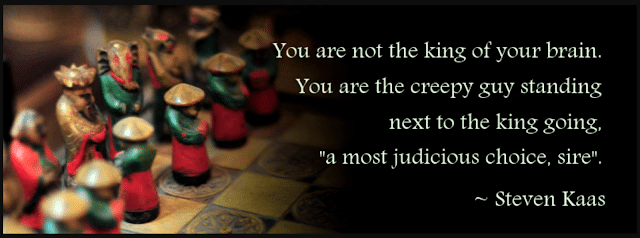What a piece of work is a man! how noble in reason! how infinite in faculty! … in apprehension how like
a god! (Hamlet II:2)There is a powerful tension in our relationship to technology. We are excited by egalitarianism and anonymity, but we constantly fight for our identity. (David Owens)
When I was a child, it was obvious to me that we differed from animals by virtue of our reasoning faculties. And this is a commonly shared sentiment, as expressed by Hamlet and many others; our ability to reason is a central part of our humanity; as parents and as teachers we treasure the capacity and nurture it in our children and students. The use of reasoning has brought us many marvels – not least the doubling of our life span and great material wealth. It is interesting, however, that our longer lives and freedom from hunger have given us room to see that notions of reasoning and rationality run deep; they are entwined with our notions of identity, and so have important implications that are not immediately obvious until challenged.
Technology provides just such a challenge. In her book Life on the Screen, sociologist Sherry Turkle describes her research with young people into self-image. She find that older people tend to describe humans as ‘rational animals’ – along the lines described by Hamlet perhaps; but younger people are increasingly describing humans as ‘emotional computers’. These are two very different ways of seeing the human condition – as basically animal or machine, with extra, additional qualities. The latter may initially seem a little alarming, but may simply be a fact of life now; the interactive, responsive computer provides us with a powerful metaphor which, like it or not, will shape self-image. Most of us certainly have more contact with machines than we do animals; small wonder we are changing our outlooks.

The draw of the metaphor is amplified by social-media, which offer a new way to interact with others. As we are in large part social beings, the nature of these interactions plays a large part in the formation of our identity. You will be no strangers to the amount of time we all now spend online, at school, at work, at home and even on holiday. The implications of all this for families, schools and societies are far from clear, but I don’t believe we can toy with these deep-rooted metaphors without some repercussions. If you believe the hype, the IT revolution will usher in a new wave of social progress and personal liberation, the like of which has not been seen since the Enlightenment. If you don’t believe the hype, however, you may see greater evolution than revolution, or even object to the proliferation of screen-time. What seems beyond question, however, is that computers are having an effect broader than simply their immediate location. As a laptop school we are conscious of this, and seek to guide the students so that they take an active and empowered approach to technology. We want them to see that like any tool, technology must be used carefully, when appropriate and with regard to others.
Jeff Plaman, our HS Digital Literacy coach has been working hard with students to address these ideas. Recently, he presented a workshop during assembly for our Grade 9 & 10 students exploring the idea behind what we commonly refer to as “balanced use of technology.” Students explored what connotations the word balance implies and contrasted two TED speakers, Sherry Turkle – talking about how we might be creating situations where we are “connected, but alone” – and Alexandra Samuel who takes the view that our engagement in online communities is actually “real life too.” Given the reality we face, Jeff argued that disengagement not a serious option, so we need to use these perspectives to decide how not if we engage with technology. He challenged students to critically examine their technology habits and set goals based on Samuel’s article in The Atlantic “Plug in Better: A Manifesto”. This article makes specific family-friendly suggestions about how to manage online life, and I strongly recommend it to you. Jeff has done a great deal of thinking and reflecting via his blog on how best to use the available information to help our students become mindful learners, friends, and family members, and I very much hope we can all be part of this conversation.


